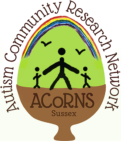Recalling specific past experiences is critical for various formal social interactions. You find them in a lot of everyday situations as well as formal ones. In policing, employment and healthcare interviews this specific recall can be quite important. When being questioned for a witness statement or interviewed for a job, how can you ensue you remember and report accurately? This can be difficult for autistic adults.
What we know
Autobiographical memories are personally experienced events and facts related to the self. They are organised hierarchically with cues activating the general memory followed by the specifics. Normally during retrieval, we must inhibit the irrelevant bits of information associated with the memory. The article suggests that autistic individuals may struggle with this due to having problems with using the self as an effective memory organisation system. This could be further affected by (as the article suggests): theory of mind, executive processing demands and difficulties, relational processing difficulties and struggling to form an implicit understanding of the questioner’s response. Difficulties in recall by autistic people are often characterised with an over-general recollection, retrieving fewer or less specific memories, and taking longer to do so. Our group also considered that self-insight linking with memory could be context dependent and pulling that out in an interview can be hard. An example could be in a job interview being asked to give an example of when you showed good communication skills. This can be difficult without the spoken context of the example needing to be in an employment setting.
What the authors found
The study found that Visual-Verbal prompting improved specificity of answers. This technique uses a gesture or image alongside verbal questioning to help with memory recall. In a healthcare setting this could include pointing to places on the body to aid memory of symptoms. The study also found that autistic participants did not have a lower proportion of relevant episodic detail: there was just more irrelevant detail alongside it. By having more detailed and explicit questions there may be less impact of the task demands that can interfere with memory recall. We wondered whether differing communication styles could have an impact on how an autistic person may answer the questions presented to them. Deciding what is relevant or not could also be a factor. Autistic people may not be able to figure out what information would be relevant to provide, so give too much information as a method to ensure they answer fully. Even just reporting why decisions were made or clarity of relevance during interviews can be insightful.
Our thoughts
Our group felt that the study has a focus on listening to autistic people and their experiences which was important. Autistic people can experience problems with self-advocacy and unmasking in employment settings. Many have spoken about troubles with making inferences in settings such as meetings, understanding unspoken social rules and not always feeling able to ask questions. Within interviews, being given more cues may help with employment chances of autistic individuals, as it would remove the potential barrier of having to question the interviewer. We felt the phrase ‘more specific, more helpful’ was a good consideration to have when asking questions that rely on autobiographical memories, regardless of the setting they are being used in.
Links
https://journals.sagepub.com/doi/full/10.1177/1362361320909174
